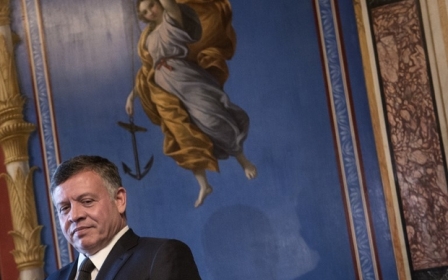Jordan withdraws tax bill after a week of protests

Jordan's new prime minister on Thursday announced a controversial IMF-backed income tax bill will be withdrawn after it sparked a week of protests in the kingdom.
Crowds have taken to the streets to demand the government drop the unpopular reforms in some of the biggest economic protests to hit Jordan over the past five years.
Doctors, lawyers and teachers staged a strike across the country on Wednesday as discontent over high unemployment, poverty and price rises bubbles over.
New premier Omar al-Razzaz, appointed by King Abdullah II after his predecessor quit over the protests on Monday, announced after talks with legislators that an "agreement had been struck" to withdraw the bill.
He said the legislation would be sent back by parliament to the government once a new cabinet is formed, with that process expected to take several days.
Razzaz was ordered by the king to carry out a "comprehensive review" of the tax proposals after the country was shaken by days of protests.
Jordan has blamed its economic woes on instability wracking the region and the burden of hosting hundreds of thousands of Syrian refugees without adequate international support.
The tax bill was the latest in a series of austerity measures to cut national debt since Amman secured a $723m loan from the IMF in 2016.
The controversial legislation that has sparked much of the ire would have raised taxes on employees by at least five percent and on companies by between 20 and 40 percent.
Although a majority of deputies said they would vote against it, protesters still staged repeated night-time demonstrations after breaking the Ramadan fast to demand the bill be withdrawn altogether.
The authorities scrambled to defuse the public discontent, but the call by the king to review the tax bill and resignation of prime minister Hani Mulki failed to stem the protests.
Scuffles took place on Wednesday between police forces, mobilised in large numbers, and some 2,000 demonstrators who tried to repel them in the capital Amman.
Demonstrators waved Jordanian flags or carried placards reading "I'm afraid for my future", while others held up loaves of flatbread with "corruption = hunger" written on them.Since January, resource-poor Jordan has seen repeated price rises for staples such as bread, as well as extra taxes on basic goods.
Fuel prices have risen five times since the start of the year, while electricity bills have surged by 55 percent since February.
"Prices are constantly rising on all products: food, cars, housing and telecommunications ... We do not work for ourselves anymore, but to pay the state," unemployed protestor Suhaib Rabaibai told AFP on Wednesday.
Jordan, a key US ally, has largely avoided the unrest witnessed by other countries in the region since the Arab Spring revolts broke out in 2011, although protests did flare late that year after the government cut fuel subsidies.
The latest protests started last week when unions called for nationwide demonstrations.
New MEE newsletter: Jerusalem Dispatch
Sign up to get the latest insights and analysis on Israel-Palestine, alongside Turkey Unpacked and other MEE newsletters
Middle East Eye delivers independent and unrivalled coverage and analysis of the Middle East, North Africa and beyond. To learn more about republishing this content and the associated fees, please fill out this form. More about MEE can be found here.




